Holy Week & The Paschal Triduum
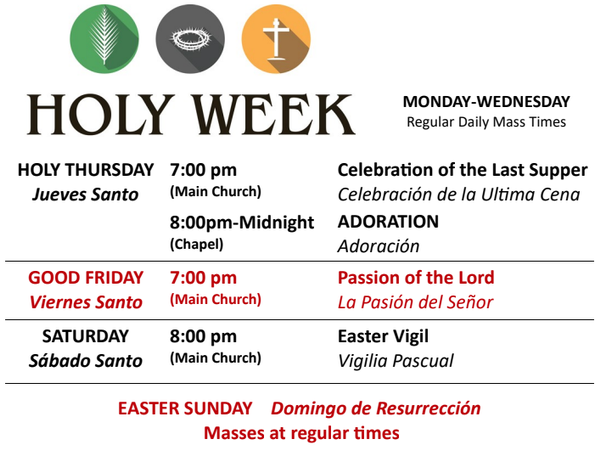
Our celebration of the holy season of Lent is coming to an end as we've entered into Holy Week and are getting ready to move into the celebration of the Sacred Paschal Triduum. The Triduum is the time between Lent and Easter - it comprises the days of Holy Thursday, Good Friday, and Holy Saturday, and it's the holiest time of the year for Catholics, with some of the richest, most mysterious and sacramental celebrations of the year.
Holy Thursday gives us a chance to enter into the celebration of the Last Supper with Jesus and the Twelve Apostles. We gather together - just as they did - to pray, to share in the joys of the Eucharistic celebration, and to gather strength from our community. We strive to recognize ourselves in the obstinence of Judas, in the brashness of Peter, in the youthful exuberance and trust of John, and in the tumultuous preparation for the passion of Jesus. But we also take solace in the gift of the institution of the Eucharist that night, and rejoice in the gift of Jesus' own presence in our churches, in our homes, in our famines, and in our hearts and lives.
On Good Friday we gather together to journey with Jesus on the Via Crucis, the Way of the Cross. We follow our Lord and Master as the Suffering Servant, willing to give everything - even his very life - as an example of sacrificial love. Every Catholic tabernacle in the world lies open and empty - every sanctuary lamp is dark - we commemorate the day, even the very hour, of the death of Jesus.
But on Saturday at the Easter Vigil, we gather together in the evening to once again to celebrate the coming light of the Resurrection. We finish the liturgy begun on Holy Thursday, we brandish fire to chase away the darkness of death and despair, and we join our voices in a glorious Alleluia to our Risen God and to our own eventual resurrection.
As we prepare to finish our Lenten journey as a parish and school community, I urge you, as parents and as the first teachers of the faith, to make time - wherever you may be - to lead your family to the prayers, the rituals, the sacraments, and the mysteries of the Sacred Paschal Triduum, so that we may more fully appreciate and celebrate the gift and the joy of the Easter resurrection. Like Jesus, may we be bringers of this Good News into the lives of those around us, especially those young lives gifted and charged to our care.
May each and every one of you have a blessed and wonder-filled Triduum and Easter celebration.
Blessings & Peace,
Hugo De La Rosa III
March Parable, Saint & Virtue
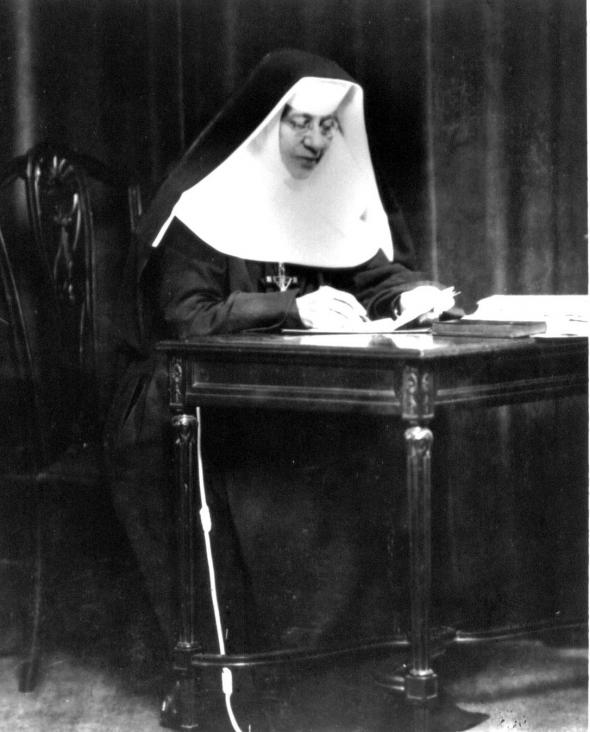
Each month at Our Lady of Sorrows we explore a particular parable of Jesus, a saint from the great cloud of witnesses that surround us (see Hebrews 12:1), and a virtue (generally taken from the fruits of the Spirit [Galatians 5:22-23, 2 Corinthians 6:6, Ephesians 5:9, & 2 Peter 1:5-7] or the cardinal & theological virtues). The parable, saint and virtue are incorporated into our morning prayer, religion bulletin boards and religion classes. This focus on one parable, one saint and one virtue complements our Words of Wisdom program and serves as a supplement to our religion curriculum. This month we focus on the parable of the Prodigal Son (Luke 15:11-32), the virtue of Kindness, and St. Katharine Drexel.
Jesus said: There was once a man who had two sons. The younger said to his father, ‘Father, I want right now what’s coming to me.’
So the father divided the property between them. It wasn’t long before the younger son packed his bags and left for a distant country. There, undisciplined and dissipated, he wasted everything he had. After he had gone through all his money, there was a bad famine all through that country and he began to hurt. He signed on with a citizen there who assigned him to his fields to slop the pigs. He was so hungry he would have eaten the corncobs in the pig slop, but no one would give him any.
That brought him to his senses. He said, ‘All those farmhands working for my father sit down to three meals a day, and here I am starving to death. I’m going back to my father. I’ll say to him, Father, I’ve sinned against God, I’ve sinned before you; I don’t deserve to be called your son. Take me on as a hired hand.’ He got right up and went home to his father.
When he was still a long way off, his father saw him. His heart pounding, he ran out, embraced him, and kissed him. The son started his speech: ‘Father, I’ve sinned against God, I’ve sinned before you; I don’t deserve to be called your son ever again.’
But the father wasn’t listening. He was calling to the servants, ‘Quick. Bring a clean set of clothes and dress him. Put the family ring on his finger and sandals on his feet. Then get a grain-fed heifer and roast it. We’re going to feast! We’re going to have a wonderful time! My son is here—given up for dead and now alive! Given up for lost and now found!’ And they began to have a wonderful time.
All this time his older son was out in the field. When the day’s work was done he came in. As he approached the house, he heard the music and dancing. Calling over one of the houseboys, he asked what was going on. He told him, ‘Your brother came home. Your father has ordered a feast—barbecued beef!—because he has him home safe and sound.’
The older brother stalked off in an angry sulk and refused to join in. His father came out and tried to talk to him, but he wouldn’t listen. The son said, ‘Look how many years I’ve stayed here serving you, never giving you one moment of grief, but have you ever thrown a party for me and my friends? Then this son of yours who has thrown away your money on prostitutes shows up and you go all out with a feast!’
His father said, ‘Son, you don’t understand. You’re with me all the time, and everything that is mine is yours—but this is a wonderful time, and we had to celebrate. This brother of yours was dead, and he’s alive! He was lost, and he’s found!’ (Luke 15:11 - 32, The Message)
The story holds a wealth of wisdom, but two themes stand out during Lent:
- The son who demands his inheritance in the story represents us. Once he gets what he wants he wastes his new found wealth in selfish pursuits. It’s only after he hits rock bottom that he decides to journey back to his father and ask forgiveness. During this holy season of Lent we are challenged to recognize our own sinfulness, and make a similar journey to our Heavenly Father, asking for and receiving his forgiveness through our celebration of the Sacrament of Penance and Reconciliation.
- The son who stayed faithful to his father represent us as well, especially those of us who regularly practice our faith. We can become so “righteous” that we start to unjustly judge those who we consider to be “less Christian” than we are, whether that’s because of their Church attendance, their choice of livelihood, the way they dress, the music they listen to, their country of origin, or any other number of criteria. We are challenged during this season of Lent to pray, fast and give to charity to help us break down that hardness of heart that leads us to unjustly judge others because they sin in different ways than we do.
Virtue of the Month: Kindness
Tied closely to our monthly parable is the virtue of kindness. Kindness is a habit that strengthens our ability to give of ourselves to others, without asking for or expecting anything in return. We model that self-sacrificing attitude on Jesus, who gave everything he had – even his very life – to try and show us the depth of God’s love. Kindness helps us to accept the circumstances of our lives (unlike the first son) and allows us to celebrate the circumstances in other people’s lives (unlike the second son). While this virtue begins in our heart and souls, kindness is incarnated through our actions to others – small, medium or large acts of love and service that help spread the radiant joy of our kind and merciful God.
May this month help us practice the virtue of kindness so that we may rejoice with all the angels and saints during this holy season of Lent.
Saint of the Month: St. Katharine Drexel
St. Katharine Drexel was born in Philadelphia on November 26, 1858 to a wealthy and devout family. Her parents set a great example of putting their faith - especially the spiritual and corporal works of mercy - into action, and Katharine took that lesson to heart. After speaking with Pope Leo XIII in 1887, Katharine followed the prompting of the Holy Spirit and took vows as a nun with the express purpose of helping Native Americans and African Americans who were living in poverty.
Katharine spent the rest of her days teaching and raising funds for those two disenfranchised communities. She financed the publication of a Navajo-English catechism and founded Xavier University in New Orleans, the first Catholic University in the United States for African-Americans. By the time of her death, she had more than 500 Sisters teaching in 63 schools throughout the country and she established 50 missions for Native Americans in 16 different states (http://www.catholic.org/saints/saint.php?saint_id=193).
St. Katharine exemplifies our virtue for the month, reminding us that those who are lucky enough to be born into wealth and privilege as well as those who have worked hard to earn that are called by God to help the poorest in our area and around the world. May this Lent challenge us to practice kindness in imitation of the kindness that St. Katharine incarnated to all.
Blessings & Peace,
Hugo De La Rosa III
Lent 2018

Prayer, fasting and almsgiving are the three ways that Jesus talks about our Lenten preparation in the Gospel reading for Ash Wednesday. These three avenues to holiness are traditionally prescribed for all Catholics, especially during Lent. Here are some ways we can incorporate these disciplines into our daily life, and especially into our Lenten sacrifices.
Prayer
When you pray, go to your inner room, close the door, and pray to your Father in secret.
Jesus said these words in the context of religious professionals who would pray for human acclaim. They prayed not so much out of a sincerity of heart, but for the sole purpose of having other people see them pray. They thrived on knowing that others thought they were holy and spiritual.
For our Lenten prayer discipline, we would do well to establish a regular habit of prayer. Morning and evening are natural times for prayer. We can rise 15 minutes earlier and spend some time in prayer, or we can wait until our house has settled down and make some time at night. In either case, a simple formula for prayer could flow like this:
- Take some time to still your body, quiet your breathing, silence your voice, and turn your thoughts towards God. (1 minute)
- Thank God for at least three (3) minutes. See how many different people, situations and things you can think of to give thanks for. (3 minutes)
- Acknowledge your faults before God - spend some time confessing your sins, failures, mistakes and regrets, and ask for God’s forgiveness .(3 minutes)
- Bring your petitions before God - pray for your family and friends, for our nation, for our Church, and for anyone who has asked you for their prayers. (3 minutes)
- Read Scripture - if you’re not sure what to read, open up Mark’s Gospel in the New Testament and read 1 chapter each time you pray. In less then 3 weeks you’ll have read through one full Gospel. (3 minutes)
- Listen for God’s voice - after talking and reading, spend the remaining two minutes listening for the still, small voice of the Holy Spirit. ( 2 minutes)
Fasting
But when you fast, anoint your head and wash your face, so that you may not appear to be fasting, except to your Father who is hidden.
Jesus spoke this in the context of people who would fast (not eat or drink) and then make a spectacle of it - they were, once again, looking for human praise. We can fast in secret by trying the following:
Food: We live in a country of such abundance that we sometimes forget that in other parts of our world (and in parts closer to home) some people go without food or live on very little food on a day to day basis. We can limit our intake of food and drink to remind ourselves of others, to stand in solidarity with them, and as a prayer for those who do not have enough to eat.
Electronics: We live in a world inundated with gadgets - cell phones, smart watches, mp3 players, laptops, computers, gigantic TV’s, etc. A challenging fast would be to go without non-essential electronics for a day, a week or all of Lent. It would help remind us that life is not always fast or convenient, and it would serve as a welcome antidote to the overloads of information and noise we sometimes try to process.
Almsgiving
But when you give alms, do not let your left hand know what your right is doing, so that your almsgiving may be secret.
Most Catholic parishes will have stewardship drives where we are asked to contribute our “time, talent and treasure.” Lent is a wonderful time for us to make sacrifices of all three of those precious commodities. We can spend more time on family and less on work or individual pursuits; more money on charities and less on frivolous spending; and more talents in the service of the poor and homeless in our midst. It is a great way to expand our self-centeredness into other-centeredness.
In whatever way you mark this Lent, I pray that it draws you closer to the suffering Servant. May we all become imitators of this Servant Messiah in our thoughts, words, and deeds.
Blessings & Peace,
Hugo De La Rosa III
2nd Week of Advent
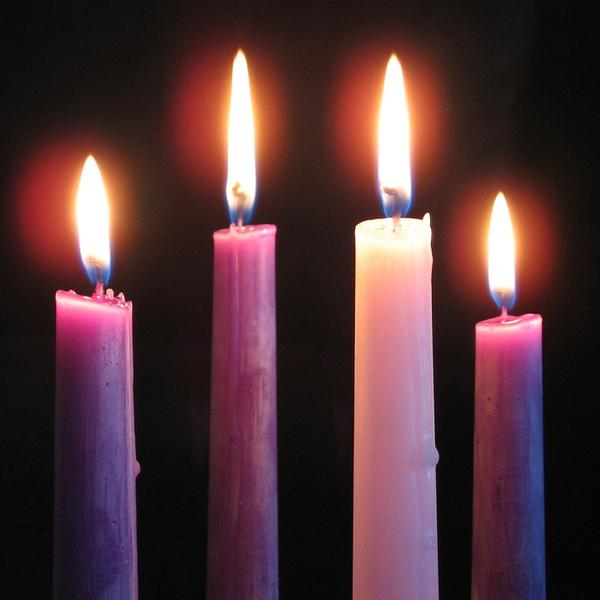
During the blessing given to the mother and father of a newly baptized child at the end of the Baptismal Liturgy, we hear these words: These parents will be the first teachers of their children in the faith, may they be also the best of teachers by what they say and do. The Second Vatican Council called each home and family “the domestic church.” With this in mind, the season of Advent provides an excellent opportunity for parents to share their faith with the whole family.
Buying (or making) an advent wreath and then setting up a prayer area in your home (somewhere near the living room or dining room, where it is clearly visible) to place it on is a good first step. Blessing the wreath, and then lighting the candle(s) before or after dinner each evening can become a way of keeping the focus of this Advent season on the coming of the Light of Christ.
Setting up a Jesse tree (especially a homemade one) can be another way of marking the days during Advent until we celebrate the birth of Jesus. Setting up Christmas lights inside or outside the home can be another way of remembering the light of Christ, especially as our days grow shorter and the nights grow longer.
Traditional Posadas or praying the rosary together are another way to fully prepare for the coming Christmas season. And of course, the best way to prepare is to attend Mass together during the season of Advent—it will help to prepare the whole family to celebrate the birth of the Baby Jesus at the beginning of the Christmas season.
In whatever ways your family prepares, remember that Jesus can stay at the center of our lives only with our attention and devotion to him—may we give God the best gift we can ever give him this Advent and Christmas season—our time.
Blessings & Peace,
Hugo De La Rosa III
Advent Reflection
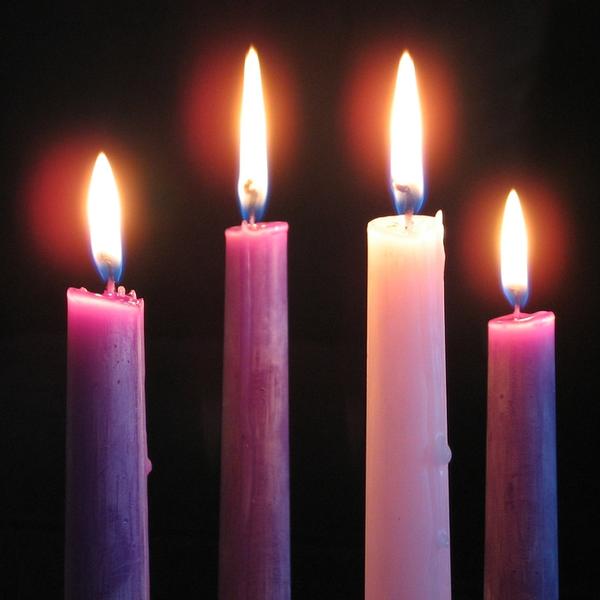
Jesus said to his disciples: “Be watchful! Be alert! You do not know when the time will come; you do not know when the Lord of the house is coming,. May he not come suddenly and find you sleeping. What I say to you, I say to all: ‘Watch!’” - Mark 13:33-37, abridged
Advent is a time to wait in joyful expectation for the coming of the newborn Son. Think of the first few weeks of falling in love with someone: you can’t wait to see them again, you yearn for the intimacy of their presence, you imagine what your time together will be like. This is what the season of Advent brings to us: time to anticipate the birth of Jesus.
The gospel reading for the first Sunday of Advent emphasizes this theme of yearning and anticipation. We are reminded that Jesus can come at any moment, and we are commanded to be on the lookout for his appearance.
But this is not just a one time “end-of-the-world” moment that we’re asked to watch for. We are challenged to be watchful for the unexpected encounters where we catch a glimpse of the presence of Jesus: a kind word from a stranger, a smile just when we need one, a word of encouragement when life is difficult, a hug from a child, a kiss from a spouse—in all of these moments of our life we are asked to look beyond the surface to the gentle, watchful presence of the Word made flesh.
May our Advent preparations help us clearly see the presence of God all around us, and may the celebration of the Christmas season find us prepared in body, mind, soul and spirit for the celebration of the birth of the Son.
Blessings & Peace,
Hugo De La Rosa III
The Immaculate Conception
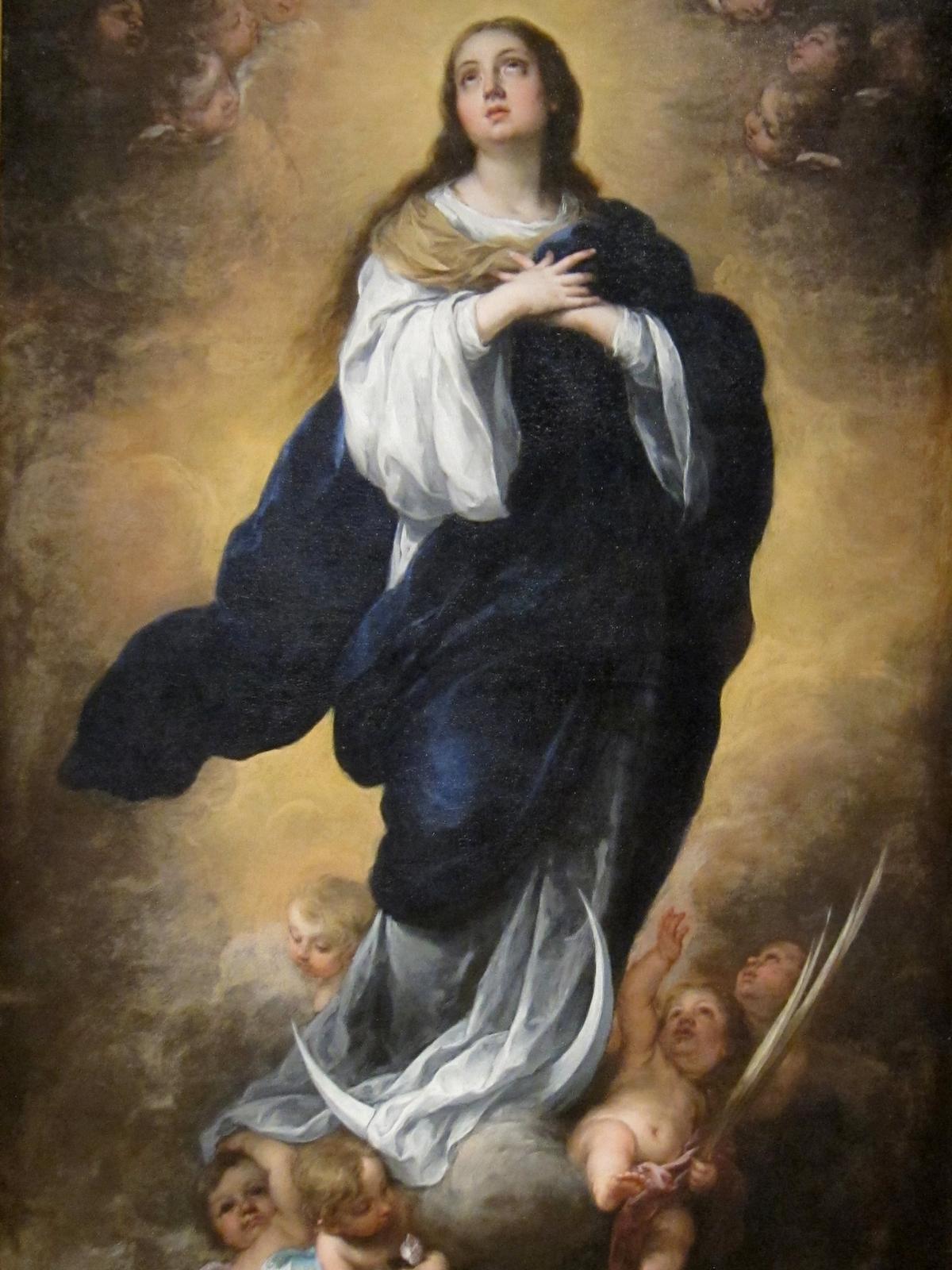
The angel Gabriel was sent from God
to a town of Galilee called Nazareth,
to a virgin betrothed to a man named Joseph, of the house of David,
and the virgin's name was Mary.
And coming to her, he said,
"Hail, full of grace! The Lord is with you."
- Matthew Ch. 1
During this blessed season of Advent we celebrate one of our church’s greatest Marian feasts: The Immaculate Conception. As a Church, we affirm two central teachings with this dogma:
- We affirm that Jesus was truly human and truly divine. Inasmuch as he was fully human, he needed a human mother, and he needed to be born as any other child has ever been born. However, inasmuch as he was fully divine, he needed a vessel of surpassing purity and holiness. Hence the need to have a mother who was in some way protected from original sin and all of its harmful effects.
- Flowing from that teaching, since Jesus, in all of his humanity and divinity, needed a sanctified place from which to be born, we also affirm that Mary, from the first moment of her conception, was spared the effects of original sin. Hence the word “immaculate”, which literally means “without stain.”
Mary is called “full of grace”, then, precisely because she never lost that sanctifying grace that our sins rob us of. Since she was free of original sin, then, she was in a state of sanctifying grace from her conception to her death.
Our Catechism says the following:
490. To become the mother of the Savior, Mary "was enriched by God with gifts appropriate to such a role". The angel Gabriel at the moment of the annunciation salutes her as "full of grace". In fact, in order for Mary to be able to give the free assent of her faith to the announcement of her vocation, it was necessary that she be wholly borne by God's grace.
491. Through the centuries the Church has become ever more aware that Mary, "full of grace" through God, was redeemed from the moment of her conception. That is what the dogma of the Immaculate Conception confesses, as Pope Pius IX proclaimed in 1844:
"The most Blessed Virgin Mary was, from the first moment of her conception, by a singular grace and privilege of almighty God and by virtue of the merits of Jesus Christ, Savior of the human race, preserved immune from all stain of original sin." (Pius IX, Ineffabilis Deus, 1854.)
When we celebrate this great feast day, then, we are celebrating Mary’s willingness to serve, Jesus’ full humanity and divinity, and we are celebrating God’s saving grace, which had prepared Mary from before she was born to be the Mother of His Son.
Blessings & Peace,
Hugo De La Rosa III
The Communion of Saints
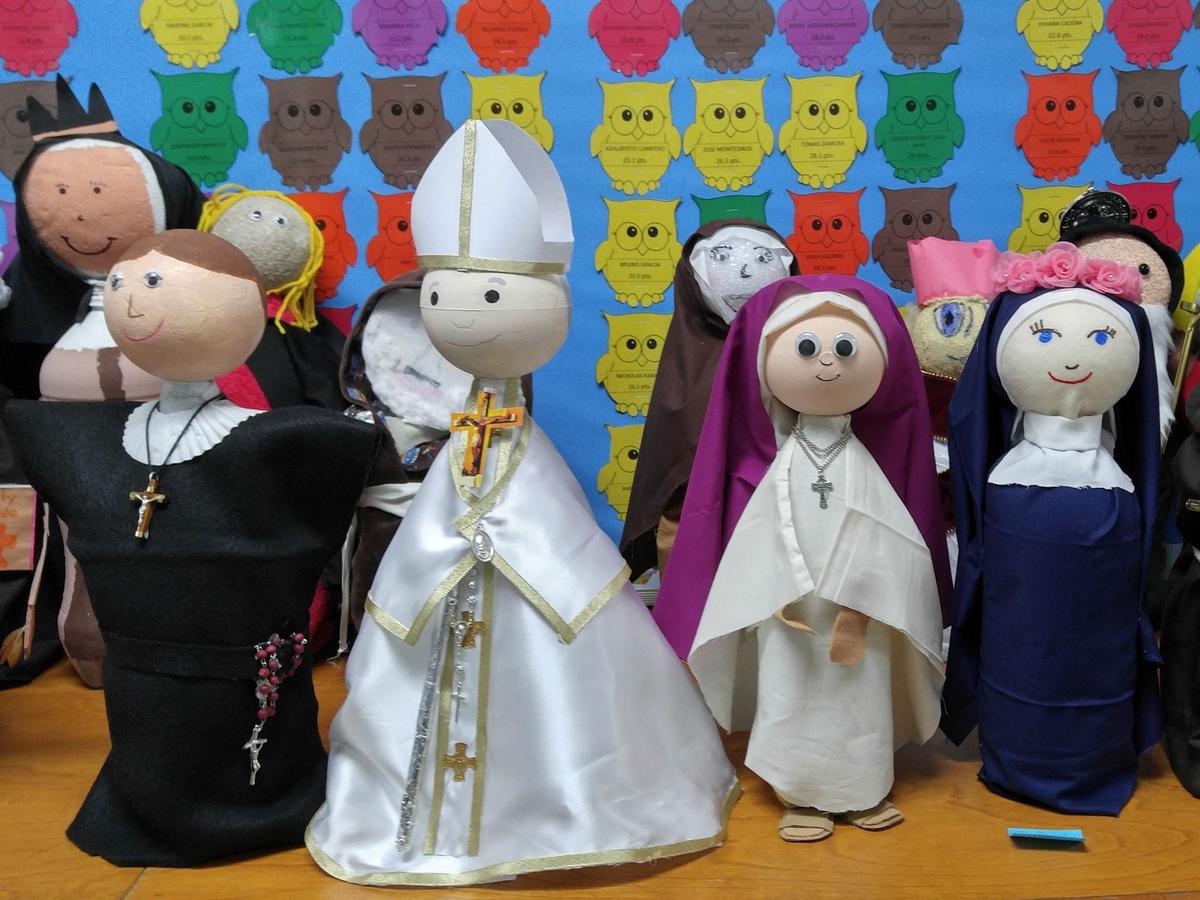
This week we celebrate two interrelated feasts: The Solemnity of All Saints on November 1st, and The Commemoration of All the Faithful Departed (All Souls / Dia de los Muertos) on November 2nd. Both of these feasts center on the reality that we are still connected to our ancestors in faith and in family. They remind us that, even though we cannot see them, those who have passed away are still very much a part of our life.
The Solemnity of All Saints focuses on those people who have lived such exemplary lives of holiness that the Church feels justified in saying they are already enjoying the beatific vision - that they are living in the full presence of God. All Souls expands the focus, centering on all of our beloved dead. Both feasts echo the teaching in our creed: “We believe in the communion of saints.”
Since we are all one in Christ Jesus, we believe that our deceased friends and relatives can still influence our lives. They can bring our prayers and petitions to the very throne of God, interceding on our behalf; just as we can ask St. Michael, or St. Teresa, or St. Joseph to pray for us, so we can ask our deceased grandmother, uncle, or parent to pray for us as well.
We can also pray for our deceased relatives and friends, asking mercy on their behalf before God, our merciful judge. We can pray for a speedy movement through purgatory, and we can pray for the rest of their eternal souls.
Finally, we can look to the lives of the saints and draw encouragement from them - priests, popes, nuns, couples, and children. We can do our best to imitate them as they imitated Christ. With over 10,000 saints officially recognized by our Church, there will be saints that resonate with us because of our age, our profession, or our current needs. There will also be saints that challenge us to pursue holiness, or to think about our faith in ways that help us appreciate the universal call to holiness in every age, every culture, and every language.
In these two intertwined feasts, we remember that out of sight does not equate to out of mind. And we pray that one day, we also will be able to see God face to face, and take our place among a long line of people who prayed that we would one day enter into heaven.
Blessings & Peace,
Hugo De La Rosa III
